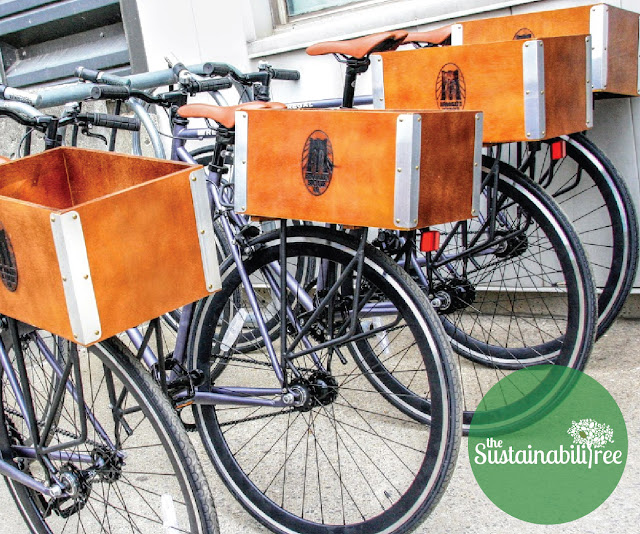The Office of Campus Sustainability is working to change the story when it comes to campus emissions, especially when it comes to fleet vehicles. So don't be surprised this summer if you notice the staff of uOttawa Facilities zipping around campus on bikes.
I once heard a talk that emphasized the idea that if you want sustainability to stick, you need to make sure that it is making your life better. It may not seem like it a first blush, but that is exactly what this initiative is all about.
So why put people on bikes? Well, there are a couple of reasons.
Employees
First, the employees wanted it. Although the uOttawa campus isn't huge, it is still a bit of a trek to go from one end to the other, even more so to get to the Lees campus. And there are always a few meetings at the hospital or City Hall. Having some bikes to move around more quickly makes everyone's job easier. The bikes are fixed gear for easy maintenance. They have a wooden box fixed to the back of them to carry some tools. They are simple and sleek with a minimal profile. They look cool and so their riders will look cool too (or at least I think so). And of course, cycling is a much healthier alternative to driving around.
The bikes are fixed gear for easy maintenance. They have a wooden box fixed to the back of them to carry some tools. They are simple and sleek with a minimal profile. They look cool and so their riders will look cool too (or at least I think so). And of course, cycling is a much healthier alternative to driving around.Car-Free
Second, the campus is moving towards having a car-free core. In the latest master plan, the University outlined the desire to remove cars from the centre of the campus, making the space more pedestrian and bike friendly. Add the that, safer, less congested, quieter, calmer, etc...If the core of the campus is supposed to become car-free, it would be really inappropriate to have all the Facilities staff moving around on campus in vans and trucks. Therefore service bicycles seemed like the most appropriate way to move around. It would not only save time (instead of trying to navigate through hoards of people walking about), it would also set an example for others by demonstrating that active transportation is a real thing.
Clean Air Community
 |
| Cars along King Edward at the University of Ottawa |
Cost Savings
It's not hard to wrap your head around the idea that it is cheaper to own a bike than a car. Maintaining a fleet of trucks and vans doesn't come cheap and so for every van we take off the road, we could replace it with ten bikes (just based on the annual cost to lease a vehicle). Pile on top of that the operating costs and you've got yourself one hell of a return on investment.There are also the external costs related to operating a fleet of truck and vans. Requiring more space for parking isn't cheap on a campus that already doesn't have enough space. Or how about insurance costs for running those vehicles? And now we can also add the cost of carbon to that list.
The Planet
I am not going to bore you with a deep dive into all the environmental benefits of a program like this. I will take a moment to mention GHG emissions (Facilites' fleet is responsible for about 79 tonnes of CO2 every year). Also, the leaking of gasoline and particles of rubber from car tires make up the biggest source of contamination in rivers, so there's that. And let's not forget the embodied energy in the materials needed to make a car are ridiculous, especially when compared to a bike.
Ultimately, one of the biggest outcomes of a program like this would be a more in-depth understanding of how cyclists see the campus. Since Facilities are responsible for all the cycling infrastructure on campus, it makes sense that if they are using it more often they would have better ideas about how to improve the system.
The 'not so good', the 'bad' and the 'ugly'
I wasn't about to end this post without talking about the downsides and limitations of a program like this. I mean that would be a little disingenuous.First, we have to consider the fact that this program is primarily meant for the summer time and likely won't fly in the winter time. Similarly, rainy weather and super hot days will likely push users to other forms of transportation.
And of course, these bikes can't be used in every situation. Some times the bikes aren't going to be the right fit for the kind of work that needs to be done. Or, if an employee is injured or tired, they might not want to use the bikes.
Hey, just putting this out there, the possibility exists that the bikes might get stolen or damaged as well. Maybe an employee might fall off too.
All that being said though, the bikes aren't meant to completely replace the fleet vehicles, just offer a viable alternative. You know, take a few more emissions out of the air and be an example to others out there.
In the past 5 years, there has been a remarkable shift in how uOttawa deals with its emissions. The signing of the Montreal Carbon Pledge, the commitment to reduce investment related emissions, and the continued success of the EcoProsperity program are all examples of some pretty bold moves to diminish the campus' carbon footprint. But not every change needs to be colossal in order to have impact. Little actions can also help change the story.
 ~jON - campus sustainability manager
~jON - campus sustainability manager









Comments